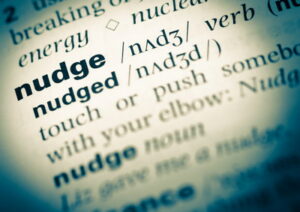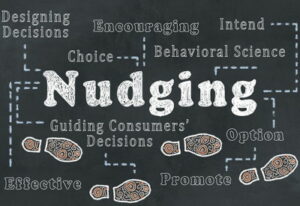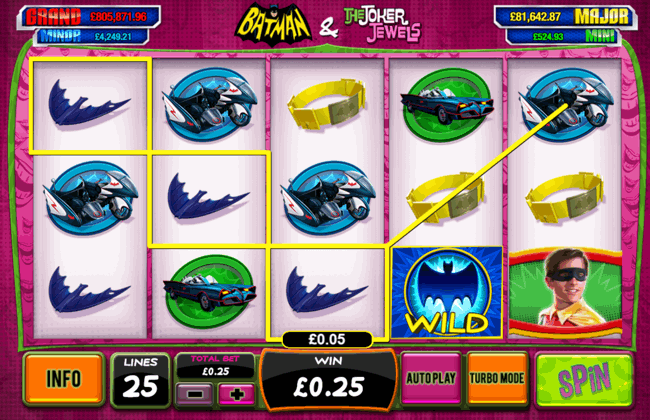 In their book Nudge: Improving Decisions about Health, Wealth and Happiness, Richard H. Thaler and Cass R. Sunstein drew on research in the world of psychology and behavioural economic in order to suggest that a form of choice architecture, known as a ‘nudge’, can be used to alter people’s behaviour in a predictable way.
In their book Nudge: Improving Decisions about Health, Wealth and Happiness, Richard H. Thaler and Cass R. Sunstein drew on research in the world of psychology and behavioural economic in order to suggest that a form of choice architecture, known as a ‘nudge’, can be used to alter people’s behaviour in a predictable way.
The thought process was that people can be encouraged to make better choices for themselves and for society. Philip Newall then built on this work to suggest that, if someone could be influenced to do something in a positive manner, they could also be encouraged to act negatively.
In essence, this is what gambling companies do to people that place bets, using techniques such as disguising losses as wins and offering the sense of them being in control to make poor decisions thanks to so called ‘dark nudges’.
Whilst nudges steer people towards options but then allow them to make their own choices, dark nudges aim to get people to make decisions that are against their own interests. Companies such as betting sites are dependent on such dark nudges to achieve what they want, which is to get people to spend money on things that they know that they shouldn’t.
The Original Concept
 Richard H. Thaler was an economist at the University of Chicago, as well as a Nobel Laureate. Cass R. Sunstein was a Professor at Harvard Law School. The pair worked together to write a book entitled Nudge: Improving Decisions about Health, Wealth and Happiness.
Richard H. Thaler was an economist at the University of Chicago, as well as a Nobel Laureate. Cass R. Sunstein was a Professor at Harvard Law School. The pair worked together to write a book entitled Nudge: Improving Decisions about Health, Wealth and Happiness.
Drawing on research from a wealth of different areas, including psychology and behavioural economics, they defended the notion of libertarian paternalism, as well as the active engineering of choice architecture. It is this latter notion that we’re concerned with here, given that it gave rise to their nudge theory.
Nudge theory was popularised by the writers in their work, which was released in 2008, and suggests that adapting designs in the decision environment will influence the behaviour and decision-making of groups or individuals. This sense of nudging differs from other ways to achieve compliance, like enforcement, legislation or education.
Nudging is actually an umbrella term that includes numerous different techniques, with the main aim of all of them being to gently try to persuade people to make decisions that would be beneficial either for themselves or for wider society in general, where it is possible to do so.
Dark Nudges

Nudges look to exploit common cognitive biases, with the aim being that behaviours and decision-making can be influenced as a result. Generally speaking, such nudges are designed to encourage people make good decisions, but in the hands of the wrong sort of person, they can be used for nefarious reasons.
These dark nudges can be used in order to encourage people to drink more alcohol, for example, or to impede the decision-making of someone in order to stop them from acting in their own best interest. This is why it is something that appeals to gambling companies.
Also referred to as ‘sludges’, these dark nudges are designed to add friction to decision-making processes, rather than make them friction free. As an example, it is relatively easy to sign up to and use an application that allows you to make financial investments, but it is much harder to close such an account down.
Thinking of the episode of F.R.I.E.N.D.S. in which Chandler Bing wants to quit the gym but finds it incredibly hard to do so and you’ll have some sense of the sort of thing that we’re talking about when discussing dark nudges.
Whether it be quitting the gym or cancelling a subscription to a newspaper, sludges are used in order to slow you down as much as possible. If you can sign up to receive a newspaper subscription with one click, why is it that you have to do ten or more things in order to cancel your subscription?
This is just one example of a dark nudge, effectively trying to persuade you that it would be much better to just keep your newspaper subscription. That is a specific example, but you can doubtless think of your own experiences.
Dark Nudges & Gambling

In his work on the matter, Philip W. S. Newall argues that gambling as an activity is ‘socially wasteful’. The losses of the gambler are transferred into the coffers of gambling firms or professional gamblers. The cost of that is borne by the gambler, their family and society at large.
It makes complete sense for such dark nudges to be used by gambling companies, given the fact that an honest gambling company that educated its users about the realities of gambling would soon find that it had very few, if any, customers willing to bet with it.
In recent times, the United Kingdom Gambling Commission has banned the use of disguising losses as wins. This was mainly done by slot machines, which would put forward celebratory images and noises for the ‘win’ of, say, 17 pence after having originally gambled £1.
Though this was actually a loss of 83 pence, users would be made to feel as though they had won something, which would encourage them to keep gambling. Though the UKGC doesn’t allow it any more, other countries aren’t as hot on limiting the influence of such dark nudges and so they continue to be used.
A similar ‘near-miss’ dark nudge is also commonly used by gambling firms. Say you’re playing a slot game in which you need to get three Bells in order to win a jackpot. You press the button, the reels spin and land on Bell, Bell, Dollar. This feels like it was nearly a win, encouraging punters to go back and keep playing because they believe they’re close to triggering the jackpot.
In reality, they are no nearer than if they had hit three Dollar signs in the first place, but the dark nudge sends them back to the game wanting to play again.
